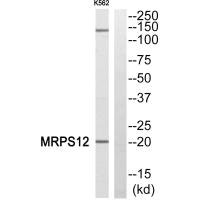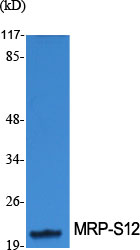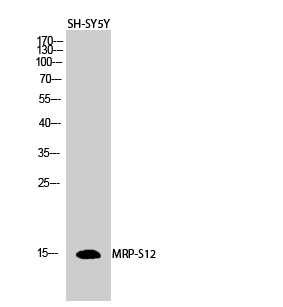
Western blot analysis of extracts from K562 cells, using MRPS12 antibody.
MRPS12 Antibody
CSB-PA788592
ApplicationsWestern Blot, ELISA
Product group Antibodies
ReactivityHuman
TargetMRPS12
Overview
- SupplierCusabio
- Product NameMRPS12 Antibody
- Delivery Days Customer20
- ApplicationsWestern Blot, ELISA
- CertificationResearch Use Only
- ClonalityPolyclonal
- ConjugateUnconjugated
- Gene ID6183
- Target nameMRPS12
- Target descriptionmitochondrial ribosomal protein S12
- Target synonymsMPR-S12, MT-RPS12, RPMS12, RPS12, RPSM12, uS12m, small ribosomal subunit protein uS12m, 28S ribosomal protein S12, mitochondrial, MRP-S12, S12mt, mitochondrial small ribosomal subunit protein uS12m
- HostRabbit
- IsotypeIgG
- Protein IDO15235
- Protein NameSmall ribosomal subunit protein uS12m
- Scientific DescriptionMammalian mitochondrial ribosomal proteins are encoded by nuclear genes and help in protein synthesis within the mitochondrion. Mitochondrial ribosomes (mitoribosomes) consist of a small 28S subunit and a large 39S subunit. They have an estimated 75% protein to rRNA composition compared to prokaryotic ribosomes, where this ratio is reversed. Another difference between mammalian mitoribosomes and prokaryotic ribosomes is that the latter contain a 5S rRNA. Among different species, the proteins comprising the mitoribosome differ greatly in sequence, and sometimes in biochemical properties, which prevents easy recognition by sequence homology. This gene encodes a 28S subunit protein that belongs to the ribosomal protein S12P family. The encoded protein is a key component of the ribosomal small subunit and controls the decoding fidelity and susceptibility to aminoglycoside antibiotics. The gene for mitochondrial seryl-tRNA synthetase is located upstream and adjacent to this gene, and both genes are possible candidates for the autosomal dominant deafness gene (DFNA4). Splice variants that differ in the 5 UTR have been found for this gene; all three variants encode the same protein. Shah Z.H., Gene 204:55-62(1997). Johnson D.F., Genomics 52:363-368(1998). Ebert L., Submitted (MAY-2004) to the EMBL/GenBank/DDBJ databases.
- ReactivityHuman
- Storage Instruction-20°C or -80°C
- UNSPSC41116161






